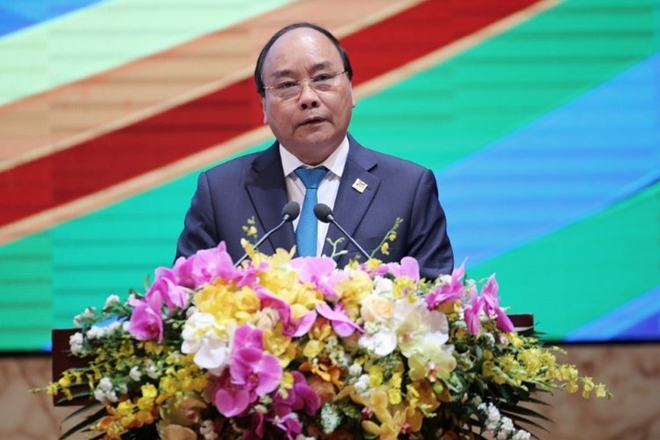Vietnam sets out green ambitions with bold targets for solar, rare earth
Vietnam plans to more than triple the amount of electricity it produces from renewable sources and push for a 26 percent increase in household solar energy usage by 2030, Prime Minister Nguyen Xuan Phuc told Reuters in an interview.
 |
|
Vietnam's Prime Minister Nguyen Xuan Phuc delivers a speech at the sixth Mekong Greater Sub-Region Summit (GMS-6) in the National Convention Center (NCC) in Hanoi, Vietnam March 31, 2018. Minh Hoang/Pool via REUTERS |
Speaking ahead of Vietnam’s participation in the expanded G7 summit that will be held in Canada from June 8 to 9, Phuc also said he hopes the country can utilize its roughly 20 million tonnes of rare earth reserves, which he said are the world’s third-largest, in building new energy technologies.
“Vietnam is blessed with immense potential for clean renewable energy development,” Phuc said in a written response to questions from Reuters.
“We wish to cooperate in research and development and transfer of advanced technologies in mining and in-depth processing of rare earth in order to create high value-added and environment-friendly products,” Phuc said.
Vietnam’s largest rare earth mine is located in the northern province of Lai Chau, near the border with China. The metallic minerals are essential for technologies such as wind turbines, electric car batteries, solar panels and smartphones.
Vietnam has been seeking to promote renewable energy development to reduce its increasing reliance on coal for electricity generation.
According to its Strategy of Renewable Energy Development, by 2030 Vietnam plans to reduce its use of coal products by 40 million tonnes, Phuc said.
Vietnam will consume 156.6 million tonnes of the fuel by 2030, according to a forecast in a 2016 report on the Ministry of Industry and Trade website.
By that time, coal-fired power plants will account for 53 percent of Vietnam’s total power generation capacity, compared with the current level of 45 percent, the Ministry said.

